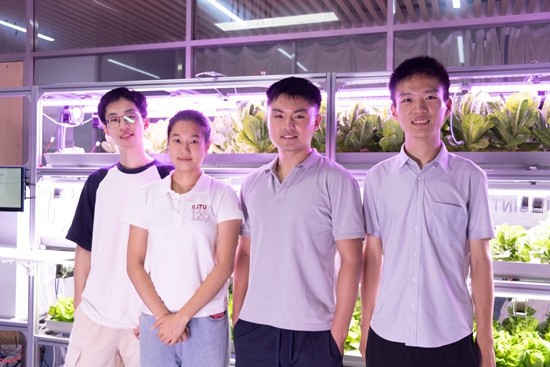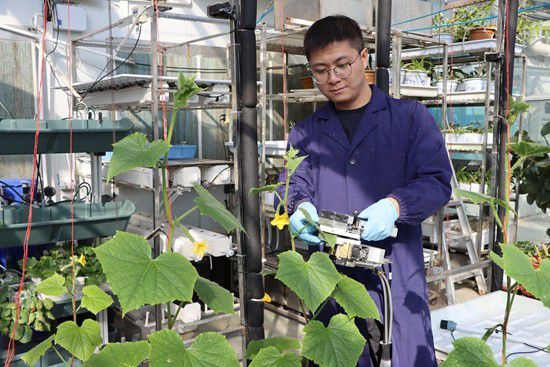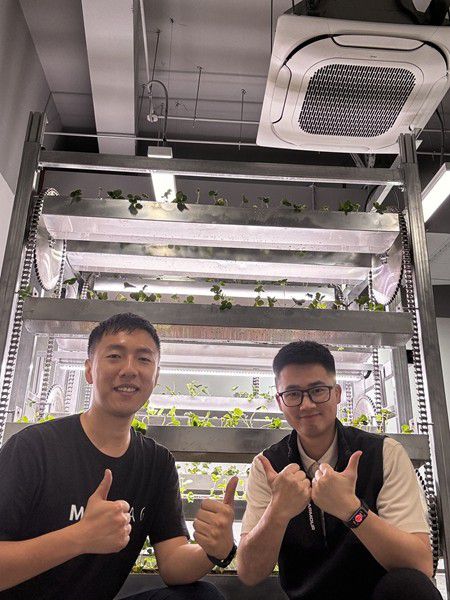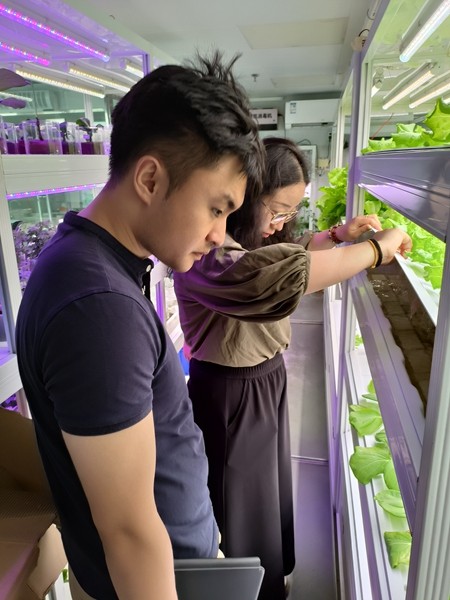




- BRNN
- BRI News
- BRNN News
- Database
Official Documents Polices and Regulations
Inter-government Documents International Cooperation BRI Countries
Business Guide Economic Data BRI Data
Trade
Investment Projects Latest projects
Cases - Content Pool

Xiong Yuanke (second from right) and his teammates pose for a picture in a plant factory at Shanghai Jiao Tong University in Shanghai in August 2024. (Photo courtesy of the interviewee)
The 2024 Smart Agriculture Competition is being held on Chongming Island in east China's Shanghai. The competition involves a number of teams led by young people as they compete to grow lettuce using a variety of cutting-edge technologies. These technologies include an intelligent control system that integrates large and small-scale models, an energy-efficient air conditioning control algorithm, condensate water recycling, and a rotating planting rack, among others. The team that manages to achieve high yields, top-notch quality, low energy consumption, and minimal expenses will emerge victorious.
Among the participants is Qin Chuhan, founder of a vertical agriculture company in Canada. Qin, formerly a programmer, sees the world as a place where everything can be quantified and follows specific rules. In his view, coding can be applied to all things, even agricultural production.
Qin aims to create a high-tech plant factory that doesn't rely on natural conditions for plant growth. By using his coding skills, he can precisely control the environment for plants, providing the right temperature, light, water, air, and nutrients they need.

Yang Hao assesses the photosynthetic efficiency of cucumber plants in a greenhouse at China Agricultural University in Beijing. (Photo courtesy of the interviewee)
Plant factories disrupt the traditional farming approach by creating an ideal environment for plant growth indoors. With the help of artificial intelligence (AI) technology, the environment is tailored to meet the specific growth requirements of plants, maximizing their potential and increasing production efficiency and yield.
For example, in traditional farming, leafy vegetables can only be cultivated a few times a year. However, in a plant factory, they can be grown continuously without the need for fallow periods. This shortens the growth cycle and has the potential to increase yields by tens or even hundreds of times compared to traditional farming methods.
Qin estimates that the annual yield from his plant factory could be 40 to 70 times higher than that of traditional growing methods.
Another competitor, 25-year-old Xiong Yuanke, and his teammates grow lettuce in a shipping container on Chongming Island. Xiong shares the same goal as Qin, which is to make humans no longer rely on the weather for food.
Xiong is a newcomer to farming. As a student studying energy dynamics at Shanghai Jiao Tong University, his primary research interest lies in the energy systems of air conditioning. While observing his parents using software to purchase vegetables, he noticed that vegetables in Shanghai are often transported from distant locations. This led him to ponder: why not cultivate vegetables within the city itself?

Qin Chuhan (first from left) and his colleague assemble a planting module and pose for a photo in their Shanghai office. (Photo courtesy of the interviewee)
"I want to give this a shot." Xiong contacted teachers and classmates at the school who were involved in researching plant factories, and they all agreed to join forces for two sessions of the Smart Agriculture Competition.
In vertical farming, electricity represents the biggest expense in operations. Data shows that producing 1 kilogram of lettuce in a plant factory consumes approximately 10 kilowatt-hours (kWh) of electricity, with electricity expenses making up 40 percent to 70 percent of the total costs.
In the competition, cost reduction is a crucial factor for making plant factories accessible to regular farmers. The organizers have imposed a budget cap of 400,000 yuan (about $55,298.80) for each team, covering expenses for hardware, software, automation, installation, and transportation.
Teams that can deliver high yields, top-notch quality, and cost efficiency stand a chance to emerge victorious.
Xiong's team brightened up the interior of the container by applying a reflective film on the walls, which increased light efficiency and saved 45 percent of energy consumption. They also developed an energy-saving control algorithm for the air conditioning system, reducing daily power consumption from 70 kWh to less than 30 kWh within the container.

Xiong Yuanke (first from left) visits and engages in discussions in a plant factory in south China's Guangdong Province in July 2024. (Photo courtesy of the interviewee)
To boost yield per square meter, Xiong's team exposed the lettuce to music. They conducted an experiment and the findings revealed that the two groups of lettuce that were exposed to music for three hours daily experienced an overall yield increase of approximately 10 percent.
Following the previous competition, Xiong decided to set aside his almost half-finished master's thesis on subway air conditioning systems and embarked on a new thesis project centered on plant factories. In September this year, he commenced his pursuit of a doctoral degree at Shanghai Jiao Tong University, specializing in the biological environmental control and energy systems of plant factories.
According to a staff member from the organizer of the competition, 90 percent of the young participants expressed their intention to pursue a career in agriculture in the future.
Li Shenghui, (a pseudonym), hailing from a rural background, had never dabbled in farming nor shown any inclination towards growing vegetables. Yet, drawing inspiration from his parents' toil in the fields nurturing crops like corn, tomatoes, and leafy greens, he crafted algorithms and applied them to grow lettuce in a container. His dream is to bring this innovative technology back to his hometown, with the aim of benefiting the local community.
Yang Hao, a doctoral student at China Agricultural University, shared his joy and pride in planting lettuce for the first time. Yang, with a diverse academic background, has been deeply involved in lettuce cultivation for eight years.
Yang aims to use his expertise and technology to minimize manual labor in agriculture, imagining a future where fewer people have to toil in the fields bending over.
China leads the world in lettuce production, accounting for over half of global output.
"However, there is still room for improvement in terms of yield per square meter," said He Yong, a judge at this year's competition and director of Zhejiang University's Digital Agriculture and Rural Research Center.
While China's research on plant factories started late, the industry has seen rapid growth, with over 250 commercial plant factories now in operation.
The first Smart Agriculture Competition was held in 2020 by China's online discounter Pinduoduo.

Tel:86-10-65363107, 86-10-65368220, 86-10-65363106